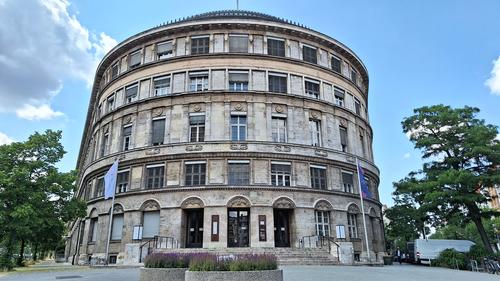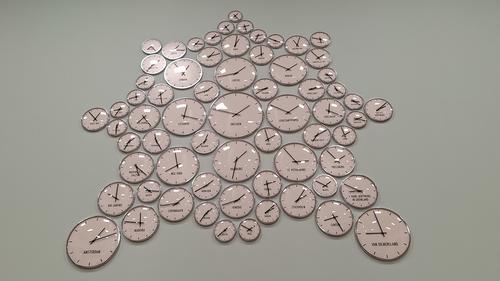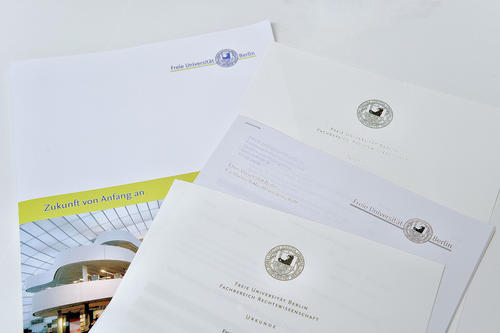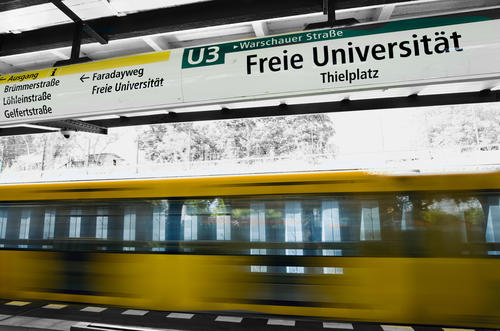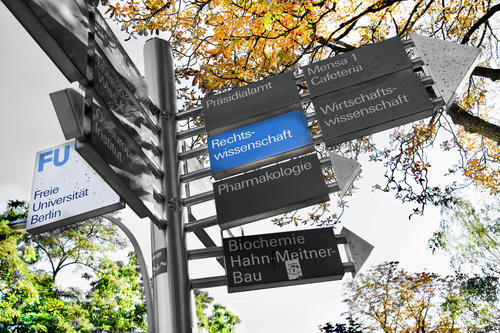Law programme targeted at the first legal examination
Law and legal studies in Germany differ fundamentally from the system of legal education in many other European countries. The German legal education is based on the „Einheitsjuristen“ model. Upon successfully passing two state examinations (Staatsexamen) and completing a two-year legal traineeship between them, a lawyer becomes qualified to serve not only as a judge but to pursue any legal profession. This ensures that each student completes the same path to become a ‘Volljurist’.
Further information on the programme:
Gemeinsames Juristisches Prüfungsamt der Länder Berlin und Brandenburg (GJPA)
Image Credit: Grit Rother
Students enrolled in the law programme targeted at the first legal examination at the Law Department of Freie Universität Berlin should develop the ability to comprehend the law, including its philosophical, historical and economic foundations, as well as the foundational principles of law-making policy.
In particular, students should acquire the knowledge and skills necessary to practice law, understand the methods for evaluating legal decisions and shaping legal frameworks, along with the criteria for doing so. Another aim of the study programme is to establish a relationship with the legal practice and to foster the students‘ academic skills, which also includes integrating findings from other fields of social science.
The law programme targeted at the first legal examination consists of four different parts: the introductory year, the intermediate year, the specialisation year and the revision year. In addition, vocational preparation courses have to be attended. Courses at the Law Department are held in German.
The introductory year is concluded by the intermediate examination, for which all modules of the first year have to be passed. Students will take two written exams each in the fields of civil and public law, one written exam and one term paper in criminal law as well as two further written exams in history of law and legal theory.
In the intermediate year, students will continue to build upon their previous knowledge in the three core areas: civil law, criminal law, and public law, complemented by the respective procedural law of each area and current European law verified by mandatory term papers and written exams. Furthermore, students have to prove their academic skills by writing a profound paper in an area of their choice.
The elective subjects of the specialisation year serve to build the profile of the Law Department and are determined according to the areas of expertise and research interests of the teaching staff. Students may choose among seven different fields of specialisation:
- Foundations of Law
- Private consumer law, private insurance law and private international law
- Company, Business and Tax Law
- Employment Law and Social Security Law
- Criminal Justice and Criminology
- Economy, Environment and Social Affairs
- Internationalisation of the Legal System
The specialisation year consists of modules from two ‘sub-specialisations’ within the relevant field. The examination comprises two parts: a thesis with an 8-week writing time in the first ‘sub-specialisation’, followed by a 30-minute oral defence, and a 5-hour written exam covering material from the second ‘sub-specialisation’.
Following the specialisation year, the revision year reiterates all mandatory content of the entire study programme, preparing students for the state examination. This is followed by an additional term of self-study and preparation.
The first legal examination in the 10th term is conducted by the Joint Legal Examination Office of the states of Berlin and Brandenburg and comprises a written and an oral part. The written part consists of seven 5-hour exams: three in civil law and two each in criminal and public law. The oral examination consists of a 10-minute presentation by the student, followed by 45-minute examination sessions in civil law, criminal law and public law.
As part of the mandatory vocational preparation, students must complete a course that confirms knowledge of legal terminology in a foreign language of their choice. Additionally, students are required to obtain a certificate in a professionally relevant soft skills course (e.g. negotiation, communication skills, rhetoric, arbitration, mediation, or interview techniques). Finally, they must complete a three-month internship at a court, law firm, or administrative authority during the lecture-free period.
The specialisation year and the university specialization exam (see Course of Study) can be studied and completed not only at Freie Universtät Berlin but also at more than fifty international partner universities (see list). The courses there are held in the respective language of the country.
The Law Department offers one of the most extensive exchange programmes among Law Departments at German universities, with over 70 partner universities in Europe, North America, South America, Australia, Asia, and the Middle East.
The specialisation year (see Course of Study) can also be completed at an international partner university (see list).
List of our international partner universitiesThe law programme targeted at the first legal examination (Erste Juristische Prüfung / Staatsexamen) integrates the possibility of obtaining a Bachelor of Laws (LL.B.) if the modules of the first six terms and the university specialisation examination of the law studies targeted at the first legal examination are successfully completed. Afterwards, students can continue within the study framework of the first legal examination or opt for the study of related consecutive master's programmes or even for a professional career.
Please note: To qualify for certain legal professions in Germany, such as judge, lawyer, notary or state attorney, you must complete a law programme targeted at the first legal examination, followed by a state-governed legal traineeship, which concludes with a second legal examination after two years.
The Law Department’s specialist library is among the best-equipped in the Federal Republic of Germany. It is highly valued and widely used by law students not only from Freie Universität Berlin but also from other universities. In addition to the specialist library (including parent-child rooms), the department has three large lecture halls and numerous seminar rooms, a cafeteria and a student cafe (Café Tatort).
The department buildings are surrounded by a green park landscape and are just a three-minute walk from the university canteen and the Henry-Ford-Building, which houses the main lecture hall and the central university library. The campus is accessible via the nearby "Freie Universität / Thielplatz" metro station on the U3 line, which passes through the districts Steglitz, Schöneberg, Kreuzberg, Neukölln and Friedrichshain.
Please contact the FU Info Service for further information on the admission procedure:
Admission Instructions Contact for questions on admission: FU Info Service German Language Skills
